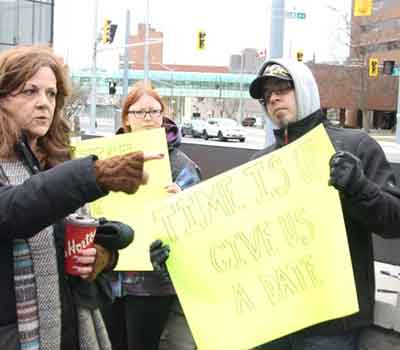Beau Baker’s family pleased by ruling to name officer involved in fatal shooting

Justice Patrick J. Flynn said “neither an anonymity order nor a publication ban are necessary”
CBC News · Posted: Oct 31, 2018
Beau Baker’s mother is pleased with a superior court decision that will prevent the officer involved in her son’s death from remaining anonymous during an upcoming coroner’s inquest.
The officer had asked that his name be redacted from the inquest brief, that he be referred to by a pseudonym throughout the inquest and that he be permitted to testify remotely or behind a screen.
He had also asked the court for a publication ban, forbidding media from mentioning his name in all coverage of the inquest.
But on Oct. 25, Justice Patrick J. Flynn released his ruling, which said that “neither an anonymity order nor a publication ban are necessary nor justified in this case.”
Family reacts to court decision
“To have [the officer] testify behind a screen, without identifying him by name, in addition to a publication ban, is the very opposite of a transparent public hearing,” reads a statement from the Baker’s family lawyer.
“This decision supports the foundational principle that our courts will remain open and transparent.”
The inquest, which is set to begin on February 4, 2019 and will examine the April 2015 death of Beau Baker and make recommendations as to how similar deaths could be avoided in the future.
Baker died after he was shot seven times by a Waterloo Regional Police officer outside his apartment building on Brybeck Crescent in Kitchener.
In his decision, Flynn pointed out that the officer was cleared of any wrongdoing by both the Special Investigations Unit and the Office of the Independent Police Review Director.
After it’s investigation, the SIU said the shooting was “legally justified” and there was “no reasonable grounds” to charge the officer.
Threat to personal safety
But the officer told the court that despite being cleared of wrongdoing, there were “credible reasons to believe” that revealing his identity would threaten his personal safety as well as the safety of his family and friends.
The officer was supported by Police Chief Bryan Larkin and the Waterloo Regional Police Services Board, which pointed to threatening posts against the officer on social media.
In Flynn’s decision, the posts are described as “crude threats and vitriolic rants and are all anonymous.”
Those opposed to the officer’s request for anonymity included Baker’s mother, Jackie Baker, and a number of interveners, including the Canadian Broadcasting Corporation.
They argued that giving the officer anonymity would infringe on section 32 of the Coroner’s Act, which states that “an inquest shall be open to the public except where the coroner is of the opinion that national security might be endangered or where a person is charged with an indictable offence.”
Public has ‘right to scrutinize’
In the end Flynn denied the request for anonymity, saying officer safety is not one of the exceptions described under section 32.
Flynn also said that while he was was “sympathetic to the officer’s concerns,” there was “no evidence of any specific threats or acts of intimidation against [him].”
“The public has a right to scrutinize and comment upon the administration of justice in this coroner’s inquest,” he said. “That can only be effectively accomplished in the bright light of day.”
He added: “There is no better disinfectant [than] bright sunlight.”